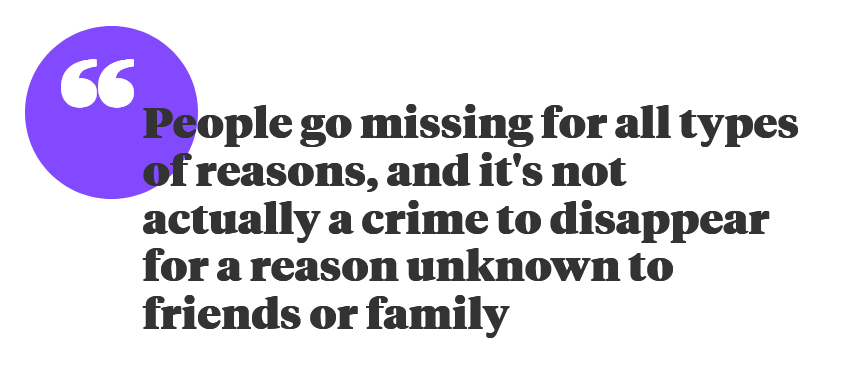Even in a world where your every move is tracked online, it’s still quite easy for someone to disappear – if they really want to.
Just ask Amy Elliott, an Australian private investigator. Amy, 29, runs her own firm called National Inquiry Agency and tracks people down for a living.
And as she tells 9Honey, if someone really doesn’t want to be found, they won’t be.
This week (July 31-August 6) is National Missing Persons Week in Australia, a cause very close to Amy’s heart.
She’s spent years dealing with confused and grieving families who have turned to her as a last resort to find their missing loved ones.
“People go missing for all types of reasons, and it’s not actually a crime to disappear for a reason unknown to friends or family,” Amy, who is also a qualified solicitor, explains.
“Some people may leave without telling anyone and there is a myth that they must have been kidnapped. But that’s not always the case.”
Australians who vanish without a trace aren’t always a victim of foul play. Sometimes, as Amy says, people disappear because they are in debt, victims of domestic violence or simply want to start afresh.
It can be an upsetting experience for family members who are desperate to track down a loved one. Oftentimes, money is the reason someone has gone “off the grid”.
“As soon as I found out there are financial problems with the person who has gone missing, I can usually pinpoint the reason or purpose for their disappearance,” she says.
“Most of the time, the person retreats to where they know and somewhere they can hide. They’ll go to their grassroots.
“So if someone is born in Canberra but now lives in Sydney, they might go back to Canberra and figure it out from there.”
When a client comes to Amy and asks for help finding a missing person, the first thing she does is check social media.
It might sound simple, but a person’s digital footprint leaves behind a wealth of clues.
Then, she’ll ask basic identifying information to try and gauge the type of man or woman she is trying to find.
“We use a mix of social media and old school methods,” she reveals.
It’s part of Amy’s job to detect the undetectable. And sometimes, she’ll have to be the bearer of bad news.
“Sometimes you get the sad news that the person is deceased or that you found the person and they don’t want any contact with the family at all,” she says.
“You just have to deliver the news as it is. People need closure and that’s why they came to us.”
Amy remembers one case where a woman vanished from a family barbecue without a trace.
The police had no leads and her loved ones got in touch with the National Inquiry Agency, desperate for answers.
“We ended up finding her and she had changed her name, her phone number and her entire lifestyle,” Amy recalls.
“She just wanted to cut ties completely. And her family just wanted to make sure that she was alive.”
Amy also spent 18 long months painstakingly tracking down a scammer who had changed his identity several times.
“His wife was, along with others, looking for him and had no idea where he was,” she says. “And he lived a double life.”
Most of the time, Amy says she finds it rewarding to have answers for families who have endured heartbreak.
She understands that some people have their reasons for going AWOL. But it’s her job to make sure they are safe.
“Family and friends of missing people are so often left in the dark,” Amy says. “And that’s where we step in.”
This week is National Missing Persons Week (July 31st – August 6th). Last year, over 53,000 missing persons reports were made in Australia to police, which is equivalent to over 145 missing persons each day.
Although 98 per cent of missing persons are located alive and well, over one third go missing more than once. This awareness week helps to raise awareness of significant issues surrounding missing persons, profile long-term missing persons and to educate the Australian community.
Article Source: HONEY.NINE.COM.AU








